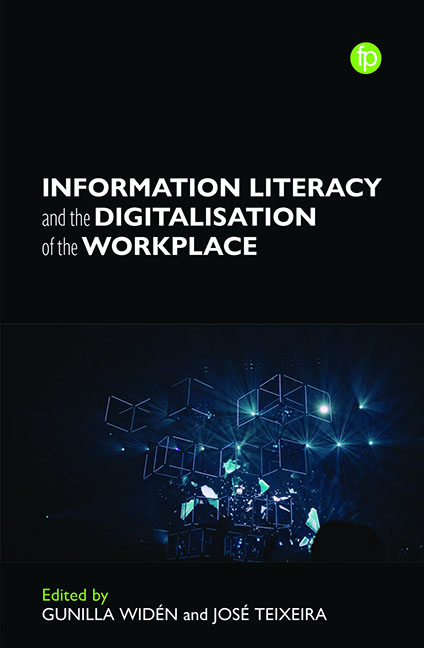Book contents
- Frontmatter
- Contents
- Figures and Tables
- Contributors
- Introduction: Advancing Theory on Workplace Information Literacy
- 1 Literature Review: In Search of the Many Meanings of Information Literacy
- 2 Digital Literacy in a Post-Digital Era: Rethinking ‘Literacy’ as Sociomaterial Practice
- 3 Methodological Choices of Information Literacy in the Workplace: Qualitative, Quantitative or Mixed-Methods?
- 4 Investigating Information Seeking and Information Sharing Using Digital Trace Data
- 5 Making Do With Limited Transparency of Sensitive Information in Secretive Organisations: Collective Information Literacy Through Hinting
- 6 Information Literacy Competencies for Career Transitions in the Digital Age
- 7 The Importance of Information Literacy for Work Satisfaction in a World-Wide-Workplace Context
- 8 Entrepreneurs’ Digital Information Sources Selection: A Perspective on the Impact of Information Literacy and Generational Differences
- 9 Conclusion: Workplace Information Literacy as the Literacy of the Digital Workplace
- Index
1 - Literature Review: In Search of the Many Meanings of Information Literacy
Published online by Cambridge University Press: 17 December 2023
- Frontmatter
- Contents
- Figures and Tables
- Contributors
- Introduction: Advancing Theory on Workplace Information Literacy
- 1 Literature Review: In Search of the Many Meanings of Information Literacy
- 2 Digital Literacy in a Post-Digital Era: Rethinking ‘Literacy’ as Sociomaterial Practice
- 3 Methodological Choices of Information Literacy in the Workplace: Qualitative, Quantitative or Mixed-Methods?
- 4 Investigating Information Seeking and Information Sharing Using Digital Trace Data
- 5 Making Do With Limited Transparency of Sensitive Information in Secretive Organisations: Collective Information Literacy Through Hinting
- 6 Information Literacy Competencies for Career Transitions in the Digital Age
- 7 The Importance of Information Literacy for Work Satisfaction in a World-Wide-Workplace Context
- 8 Entrepreneurs’ Digital Information Sources Selection: A Perspective on the Impact of Information Literacy and Generational Differences
- 9 Conclusion: Workplace Information Literacy as the Literacy of the Digital Workplace
- Index
Summary
Introduction
The concept of information literacy is crucial for an educated and literate society (Weiner, 2011). According to Annemaree Lloyd (2010) and Weiner (2011), information literacy acts as a key catalyst for learning in everyday contexts (for example, school, university or working life). If the concept of information literacy was already relevant before the emergence of computers and the internet, it is even more relevant now as the knowledge economy undergoes digitalisation and globalisation (Shapiro and Varian, 1999; Nikou, Brännback and Widén, n.d.; Autio, Mudambi and Yoo, 2021).
The conceptual foundations of information literacy keep evolving with recurring discussions – and even disagreements – on what information literacy means (Behrens, 1994; Bawden, 2001; Tuominen, Savolainen and Talja, 2005; Stordy, 2015; Webber and Johnston, 2017; Secker, 2018). The starting point for our theoretical orientation is the definition originally proposed in 2000 by the Association of College & Research Libraries (ACRL):
Information literacy is a set of abilities requiring individuals to recognize when information is needed and have the ability to locate, evaluate, and use effectively the needed information.
(ACRL, 2000)Complementing this definition, which takes a perspective centred on the individual and their skills and competencies, the ACRL (2000) also stated that an information literate individual is able to:
• determine the extent of information needed
• access the needed information effectively and efficiently
• evaluate the information and its sources critically
• incorporate selected information into one's knowledge base
• use information effectively to accomplish a specific purpose
• understand the economic, legal, and social issues surrounding the use of information and access and use information ethically and legally.
Evidencing the growing attention devoted to the information literacy concept, Figure 1.1 shows a surge of research in information literacy that started in 1990 and continued until 2019. Here, we must remark that the decline of research in information literacy coincided with the emergence of the worldwide COVID-19 pandemic in 2019. Therefore, it can be speculated that the abrupt decline of research in information literacy is down to the pandemic. What stands out the most in Figure 1.1 is the steady increase in the attention devoted to information literacy since 1990.
- Type
- Chapter
- Information
- Publisher: FacetPrint publication year: 2023

